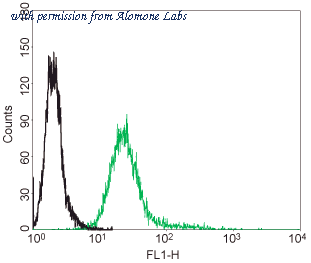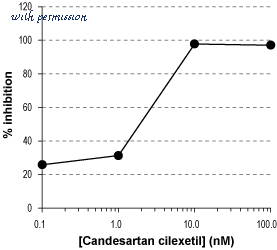product summary
Loading...
company name :
Alomone Labs
product type :
antibody
product name :
Mouse Anti-Rat p75 NGF Receptor (extracellular)-FITC Antibody
catalog :
AN-170-F
clonality :
monoclonal
host :
mouse
conjugate :
FITC
clone name :
192-IgG.
reactivity :
rat
application :
flow cytometry
more info or order :
citations: 4
| Reference |
|---|
image
image 1 :

Cell surface detection of p75NTR in live PC12 cells: Cell surface detection of p75NTR in live PC12 cells: Black line: Unstained cells. Green line: Cells + Mouse Anti-Rat p75 NGF Receptor (extracellular)-FITC Antibody (#AN-170-F) 1 µl/1x106 cells (1:50).
image 2 :

Cell surface detection of p75NTR in livePC12 cells: - ___Unstained cells.___Cells + Mouse Anti-Rat p75NGF Receptor (extracellular)-FITC Antibody(#AN-170-F) 1 l/1x106cells (1:50).
product information
CAT :
AN-170-F
SKU :
AN-170-F_50 mcg
Product Name :
Mouse Anti-Rat p75 NGF Receptor (extracellular)-FITC Antibody
Group Type :
Antibodies
Product Type :
Antibodies
Clonality :
Monoclonal
Accession :
Q08201
Applications :
FC
Reactivity :
Rat
Host :
Mouse
Blocking Peptide :
NA
Homology :
Recognizes p75NTR from rat samples only
Formulation :
PBS pH7.4, 1% BSA with 0.05% sodium azide
isotype :
IgG1
Peptide confirmation :
Confirmed by amino acid analysis and mass spectrometry
Reconstitution :
50 µl double distilled water (DDW).
Antibody Concentration After Reconstitut ... :
1 mg/ml
Storage After Reconstitution :
The reconstituted solution can be stored at 4°C, protected from the light, for up to 1 week. For longer periods, small aliquots should be stored at -20°C. Avoid multiple freezing and thawing. Centrifuge all antibody preparations before use (10000 x g 5 min).
Preservative :
1% BSA, 0.05% NaN3
Immunogen Location :
NA
Label :
Fluorescein isothiocyanate (FITC).
Storage Before Reconstitution :
The antibody ships as a lyophilized powder at room temperature. Upon arrival, it should be stored at -20°C
Shipping and storage :
Shipped at room temperature. Product as supplied can be stored intact at room temperature for several weeks. For longer periods, it should be stored at -20°C
immunogen source species :
Rat
Sequence :
Solubilized proteins from PC12 membranes.
Product Page - Scientific background :
p75NTR known as a cell surface receptor for NGF, BDNF, NT-3 and NT-4, is also a receptor for β-amyloid, and for the myelin axon repellant protein MAG.1,2,4,6 Binding of neurotrophins induces receptor dimerization followed by phosphorylation of receptor kinase residues and recruitment of intracellular proteins involved in signal transduction. p75NTR functions alone, or in functional complexes with the neurotrophin receptors trkA, trkB and trkC. p75NTR signals via interaction with different transducers such as TRAF6, IRAK, and RIP-2, activating NF-κB, JNK and p38, and inactivating rhoA.1,3,6 Receptor degradation is mediated by a metalloproteinase-dependent shedding of the extracellular domain. p75NTR binds all neurotrophins with similar nM affinity, but binds pro-neurotrophins with greater affinity, and is more potently activated by pro-neurotrophins.5 Overexpression of the intracellular domain in developing neurons induces apoptosis. NGF-dependent association of NRIF with p75NTR contributes to pro-apoptotic signaling.7,8 β-amyloid peptide binds p75NTR and stimulates pro-apoptotic signaling by p75NTR, suggesting that the receptor may be relevant for Alzheimer's disease.9
Applications may also work in :
FC
Supplier :
Alomone Labs
Target :
p75NTR, NGFR p75, TNFR superfamily member 16, TNFRSF16, CD271
Short Description :
A Mouse Monoclonal Antibody to Rat Neurotrophin Receptor p75NTR Conjugated to the Fluorescent Dye FITC
Long Description :
Mouse Anti-Rat p75 NGF Receptor (extracellular) Antibody (#AN-170) is a highly specific monoclonal antibody directed against p75NTR. The antibody can be used in western blot, immunohistochemistry, and indirect flow cytometry applications. It has been designed to recognize p75NTR from rat samples only. Mouse Anti-Rat p75 NGF Receptor (extracellular)-FITC Antibody (#AN-170-F) is directly conjugated to fluorescein isothiocyanate (FITC). This labeled antibody was specifically developed to be used in direct flow cytometry applications, especially for those that use multiple and simultaneous labeling of different markers.
Negative Control :
NA
Positive Control :
NA
Synonyms :
p75NTR, NGFR p75, TNFR superfamily member 16, TNFRSF16, CD271
Lead Time :
1-2 Business Days
Country of origin :
Israel/IL
Applications key :
CBE- Cell-based ELISA, FC- Flow cytometry, ICC- Immunocytochemistry, IE- Indirect ELISA, IF- Immunofluorescence, IFC- Indirect flow cytometry, IHC- Immunohistochemistry, IP- Immunoprecipitation, LCI- Live cell imaging, N- Neutralization, WB- Western blot
Specifictiy :
NGFR
AB Specifictiy :
192-IgG reacts with rat p75NTR. It does not cross-react with p75NTR of human or mouse origin.
Form :
Lyophilized powder
Comment :
Contact Alomone Labs for technical support and product customization
Species reactivity key :
H- Human, M- Mouse, R- Rat
Is Toxin :
No
Purity :
Affinity purified on immobilized antigen.
UNSPSC :
41116161
Clone :
192-IgG.
Standard quality control of each lot :
Western blot analysis (unlabeled antibody, #AN-170), and direct flow cytometry (labeled antibody).
Antigen preadsorption control :
NA
Application Dilutions: Immunohistochemis ... :
Contact Alomone for information
Application Dilutions: Western blot wb :
Contact Alomone for information
more info or order :
company information

Alomone Labs
Jerusalem BioPark (JBP), Hadassah Ein Kerem
P.O. Box 4287
Jerusalem 9104201
P.O. Box 4287
Jerusalem 9104201
info@alomone.com
http://www.alomone.com972 2 531 8002
headquarters: Israel
related products
browse more products
- Anti-Nicotinic Acetylcholine Receptor α1 (CHRNA1) (extracellular) Antibody
- Anti-Nicotinic Acetylcholine Receptor α2 (CHRNA2) (extracellular) Antibody
- Anti-Nicotinic Acetylcholine Receptor α3 (CHRNA3) (extracellular) Antibody
- Anti-Nicotinic Acetylcholine Receptor α4 (CHRNA4) (extracellular) Antibody
- Anti-Nicotinic Acetylcholine Receptor α5 (CHRNA5) (extracellular) Antibody
questions and comments
